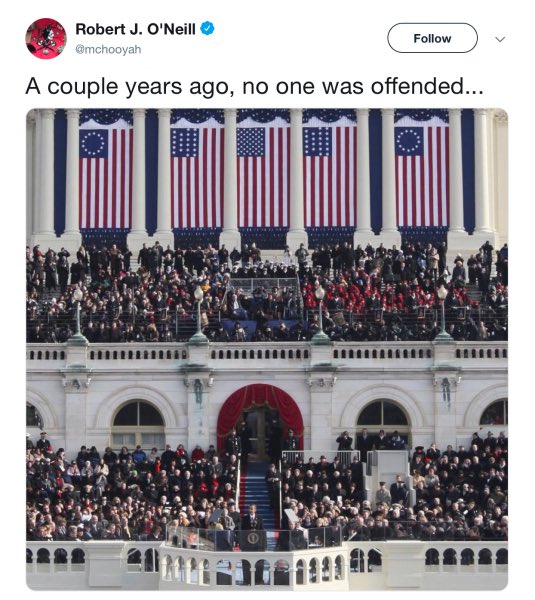Colin Kapernick probably should have cracked his history books while in school. Maybe he wouldn't be so ignorant. Before he starts a campaign against all things American he should do a little research first. Perhaps he got hit in the head too many times and he's going around in a haze just blurting out whatever comes to mind first.
Here's a few facts Colin overlooked when he decided to protest yet another one of our traditions and institutions:

Here's a few facts Colin overlooked when he decided to protest yet another one of our traditions and institutions:
- Betsy Ross was a Quaker
- Quakers were abolitionists
- Betsy Ross lived in Philadelphia
- Slavery was illegal in Philadelphia
- Betsy Ross never owned slaves

Betsy Ross (1752-1836) – Ross, a lifelong Philadelphian and a Quaker until eloping with Anglican John Ross in 1773, was 24 and widowed, an upholsterer on Arch Street when Declaration of Independence signers George Washington, George Ross, Jr. (the uncle of her late husband) and Robert Morris asked her to stitch a flag. But her life is more than that single flag. Not only did Ross’ upholstery clients include Washington and Benjamin Franklin, she also stitched hundreds of flags for the United States government, including flags that flew in the War of 1812 and flags sent as gifts on official diplomatic relations with Native Americans. At home, she lost two husbands to the Revolutionary War and cared for a third in his late life illness, reared five daughters, brought many orphaned nieces into her home and survived the yellow fever epidemic that took the lives of both her parents and a sister, living until age 84.
Quakers in the abolition movement
From Wikipedia, the free encyclopedia
The Religious Society of Friends (Quakers) played a major role in the abolition movement against slavery in both the United Kingdom and in the United States of America. Quakers were among the first white people to denounce slavery in the American colonies and Europe, and the Society of Friends became the first organization to take a collective stand against both slavery and the slave trade, later spearheading the international and ecumenical campaigns against slavery.
Beginnings
Quaker colonists began questioning slavery in Barbados in the 1670s, but first openly denounced it in 1688. In that year, four German settlers (the Lutheran Francis Daniel Pastorius and three Quakers) issued a protest from Germantown, close to Philadelphia in the newly founded American colony of Pennsylvania. This action, although seemingly overlooked at the time, ushered in almost a century of active debate among Pennsylvanian Quakers about the morality of slavery which saw energetic anti-slavery writing and direct action from several Quakers, including William Southeby, John Hepburn, Ralph Sandiford, and Benjamin Lay.

During the 1740s and 50s, anti-slavery sentiment took a firmer hold. A new generation of Quakers, including John Woolman, Anthony Benezet and David Cooper, protested against slavery, and demanded that Quaker society cut ties with the slave trade. They were able to carry popular Quaker sentiment with them and, beginning in the 1750s, Pennsylvanian Quakers tightened their rules, by 1758 making it effectively an act of misconduct to engage in slave trading. The London Yearly Meeting soon followed, issuing a ‘strong minute’ against slave trading in 1761. On paper at least, global politics would intervene. The American Revolution would divide Quakers across the Atlantic.
Links
Quakers in the abolition movement - Wikipedia
Betsy Ross - Wikipedia
The Truth About Betsy Ross
From Wikipedia, the free encyclopedia
The Religious Society of Friends (Quakers) played a major role in the abolition movement against slavery in both the United Kingdom and in the United States of America. Quakers were among the first white people to denounce slavery in the American colonies and Europe, and the Society of Friends became the first organization to take a collective stand against both slavery and the slave trade, later spearheading the international and ecumenical campaigns against slavery.
Beginnings
Quaker colonists began questioning slavery in Barbados in the 1670s, but first openly denounced it in 1688. In that year, four German settlers (the Lutheran Francis Daniel Pastorius and three Quakers) issued a protest from Germantown, close to Philadelphia in the newly founded American colony of Pennsylvania. This action, although seemingly overlooked at the time, ushered in almost a century of active debate among Pennsylvanian Quakers about the morality of slavery which saw energetic anti-slavery writing and direct action from several Quakers, including William Southeby, John Hepburn, Ralph Sandiford, and Benjamin Lay.

During the 1740s and 50s, anti-slavery sentiment took a firmer hold. A new generation of Quakers, including John Woolman, Anthony Benezet and David Cooper, protested against slavery, and demanded that Quaker society cut ties with the slave trade. They were able to carry popular Quaker sentiment with them and, beginning in the 1750s, Pennsylvanian Quakers tightened their rules, by 1758 making it effectively an act of misconduct to engage in slave trading. The London Yearly Meeting soon followed, issuing a ‘strong minute’ against slave trading in 1761. On paper at least, global politics would intervene. The American Revolution would divide Quakers across the Atlantic.
Links
Quakers in the abolition movement - Wikipedia
Betsy Ross - Wikipedia
The Truth About Betsy Ross
Last edited:



